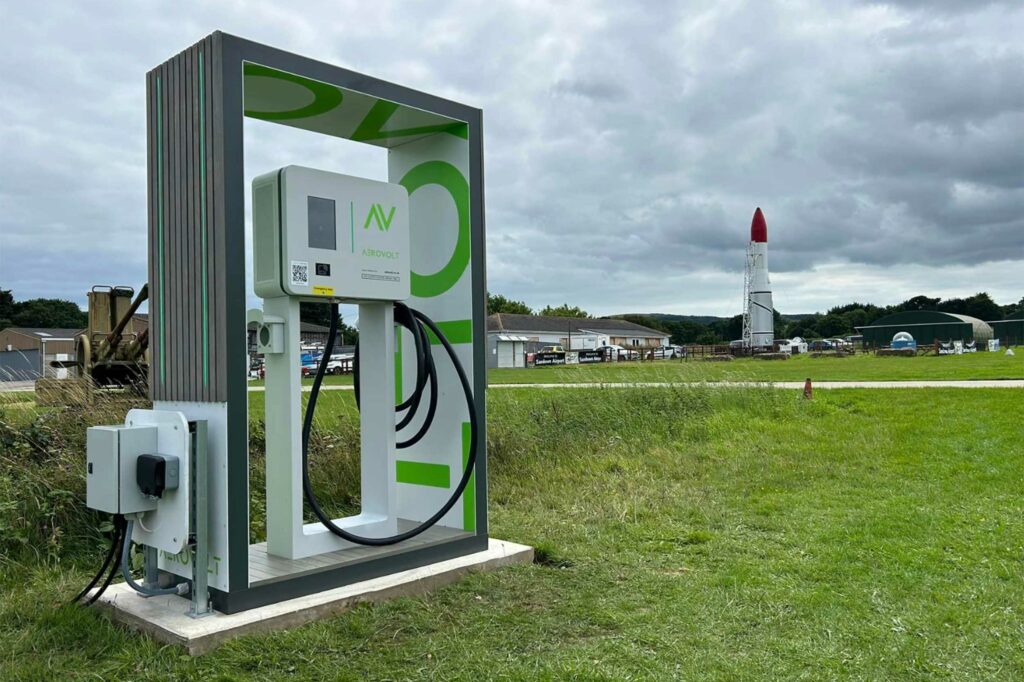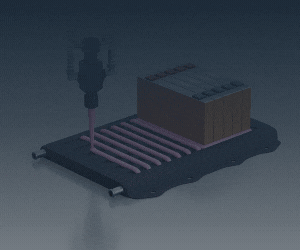First airfield-to-airfield eVTOL flight with recharging

(Image courtesy of AeroVolt)
Skyfly and AeroVolt are working on the first electric vehicle take-off and landing (eVTOL) flight in the UK between two airfields with electric charging points, writes Nick Flaherty.
AeroVolt is installing a network of aircraft smart chargers around the UK at airports and aerodromes. It currently has five operational sites and aims to have 24 running by the time deliveries of the Skyfly Axe eVTOL begin in 2025, with plans in place for over 60 sites.
The two-seat, four-wing Axe eVTOL has a 100-mile range in a fully electric configuration from the 30-50 kW battery pack or 300 miles in a hybrid configuration, and it can be flown with an existing pilot’s licence.
Using AeroVolt’s chargers, the Axe eVTOL can charge in about 3.5 hours.
The first batch of chargers are rated to 22 kW, and installation of larger 44 kW units will begin in 2024; 120kW models are also planned for the near future. Multiple aircraft – and, in some cases, electric cars – can use any charging station simultaneously.
A key factor is that the Axe can operate as a fixed-wing aircraft or a helicopter with eight motors, and it can perform glide landings with all its engines shut down, which other eVTOLs cannot replicate.
The four-wing design boosts the lift to enable longer range than ‘rotor-only’ eVTOLs, as well as an extra layer of safety from the glide performance. The Axe is fitted with a ballistic parachute, which is not possible with a helicopter due to the positioning of its rotors.
The design does not have rotating motor or wing elements, but instead has fixed-angle rotors, saving on weight, cost, complexity and maintenance.
Unlike commercial air taxis, which require ‘vertiport’ infrastructure to be built, the Axe eVTOL can take off and land in a garden, or on any agricultural land where the owner has given permission, without any modifications or expensive infrastructure.
This use is legal and well established, with many light aircraft owners operating in this way worldwide from private ‘farm strips’, and it is an opportunity for the 22 kW and 44 kW chargers.
“We cannot wait to demonstrate this capability on a real flight route, which will hopefully prove to the non-believers that electric aviation is the future of mobility. Skyfly wants to make the UK a leader in aviation again,” said Michael Thompson, CEO of Skyfly.
Skyfly and AeroVolt will conduct test flights as part of the feasibility demonstrations for electric aircraft. The tests will also confirm the compatibility of the Axe with AeroVolt’s charging and monitoring software.
Extensive analysis and prototype testing have been carried out, and manufacturing is being readied for series production by the end of 2024, when UK certification is expected.
Click here to read the latest issue of E-Mobility Engineering.
ONLINE PARTNERS






















